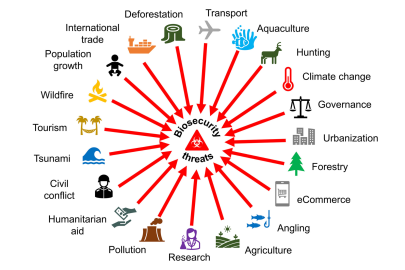
Schematic illustrating the diversity of environmental, economic, and social drivers of biological invasions. Each of the drivers depicted in the figure can lead to the introduction of invasive alien pathogens, pests, or weeds that impact human, animal, plant, and ecosystem health.
The paper outlines the additional concept of One Biosecurity, a combination of emerging advances in biosecurity that could underpin human, animal, plant and ecosystem health. The paper arose from an interdisciplinary horizon scan that identified four major interlinked biosecurity advances: implementation of new surveillance technologies adopting state-of-the-art sensors connected to the Internet of Things; deployable handheld molecular and genomic tracing tools; the incorporation of well-being and diverse human values into biosecurity decision-making; and sophisticated socio-environmental models and data capture.
These innovations emphasise the opportunity to build critical mass around interdisciplinary teams at a global scale that can rapidly advance science solutions targeting biosecurity threats, building on the collaborative momentum achieved during the COVID pandemic.
Key contacts

Rachelle Binny

Manpreet Dhami

